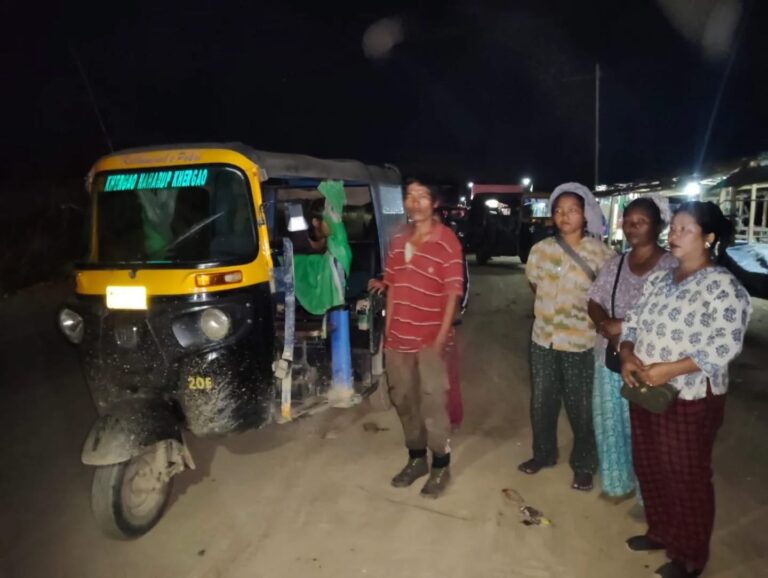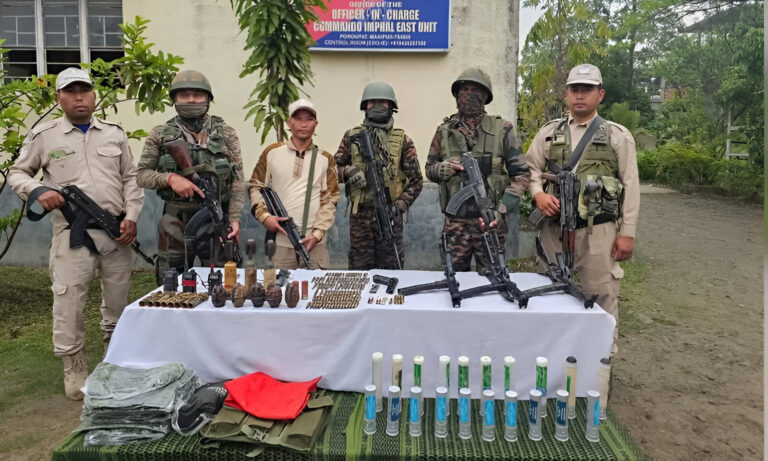Manipur Security Forces Destroy 4 Acres of Illegal Poppy Cultivation in Kangpokpi: A Bold Step Against Illicit Drug Production
Summary
Manipur security forces have taken decisive action in Kangpokpi by destroying 4 acres of illegal poppy cultivation, marking a significant blow to the illicit drug trade in the region. This operation not only highlights the commitment of law enforcement in combating illegal activities but also underscores the broader challenges of drug production, regional security, and community welfare in Northeast India.
Introduction
Have you ever wondered how local security forces combat the creeping menace of illegal drug cultivation? In the picturesque yet complex landscape of Manipur, law enforcement is stepping up its game. Recently, security forces in Kangpokpi executed a significant operation by destroying 4 acres of illicit poppy fields—a move that resonates far beyond the immediate impact. This isn’t just a story about land and crops; it’s about protecting communities, upholding the law, and steering the region toward a safer future.
In this article, we’re going to unpack every aspect of this landmark operation. We’ll dive deep into the history of poppy cultivation in the region, the challenges faced by law enforcement, and the broader implications of such actions on public health, the economy, and regional stability. So, buckle up as we take you on a comprehensive journey through the multifaceted world of illegal drug cultivation and the determined efforts to eradicate it.
Background on Illegal Poppy Cultivation in Manipur
Illegal poppy cultivation isn’t a new phenomenon in Northeast India, and Manipur has had its share of challenges. For years, the remote and hilly terrains of the region have provided a conducive environment for clandestine agricultural practices. Poppy plants, known for their role in producing opium, are not only a lucrative cash crop for some but also a major concern for law enforcement agencies.
Historical Roots and Socioeconomic Factors
Why would anyone risk growing a crop that could land them in deep legal trouble? The answer lies in the economic hardships faced by local communities. In many parts of Manipur, traditional livelihoods have been disrupted by a combination of underdevelopment, conflict, and limited economic opportunities. For some farmers, the high returns from poppy cultivation, despite the risks, can seem like a lifeline in an otherwise challenging environment.
The Illicit Trade and Its Ramifications
The illegal trade of opium and its derivatives has far-reaching consequences. It fuels not just local criminal networks but also international drug trafficking operations. The repercussions are felt in public health, where addiction and associated crimes strain community resources. Moreover, the environmental impact of such unregulated farming practices often leads to soil degradation and loss of biodiversity, compounding the region’s woes.
The Kangpokpi Operation: A Closer Look
Now, let’s zoom in on the heart of the matter—the recent operation in Kangpokpi. Imagine a scene where well-coordinated security forces, armed with intelligence and determination, sweep across fields to dismantle illegal operations. That’s exactly what happened when authorities discovered 4 acres of poppy cultivation in Kangpokpi.
The Operation Unfolded
On the day of the operation, security forces mobilized swiftly after gathering credible intelligence about the illegal fields. Working under the cover of early morning darkness, teams entered the area and began a systematic operation to eradicate the crop. Their objective was clear: dismantle the illegal cultivation network and send a stern warning to any other potential violators.
Tools and Techniques Used
You might wonder, what goes into such an operation? It wasn’t just brute force at work. The teams employed modern surveillance techniques, including aerial reconnaissance and ground intelligence, to pinpoint the exact locations of the poppy fields. This blend of traditional policing and advanced technology ensured that the operation was both efficient and minimally disruptive to the innocent locals who live in these areas.
Challenges on the Ground
Operating in rugged terrains is no small feat. The security forces had to navigate through challenging landscapes, where every step could be fraught with unexpected difficulties. Weather conditions, the risk of ambushes by well-armed local gangs, and the sheer expanse of the cultivation area all posed significant risks. Yet, the disciplined and well-prepared teams managed to overcome these hurdles, marking the operation as a textbook example of modern law enforcement in action.
The Role of Manipur Security Forces
The success of the Kangpokpi operation is a testament to the relentless efforts of Manipur’s security forces. Their role is not just about enforcing laws; it’s about safeguarding communities and ensuring that illegal activities do not spiral out of control.
Commitment to Public Safety
For the security forces, this operation was more than a routine task—it was a mission to protect public health and regional stability. By eliminating the poppy fields, they have disrupted a critical node in the illegal drug production chain, which can lead to a reduction in drug trafficking and its associated societal ills.
Collaborative Efforts and Coordination
Effective law enforcement in such cases is a team sport. Multiple agencies, including local police, state security units, and sometimes even central forces, work in tandem. Their collaborative efforts ensure that intelligence is shared promptly and operations are executed seamlessly. This unified approach not only boosts the chances of success but also builds public trust in the system.
Training and Modernization
Modern challenges require modern solutions. Recognizing this, Manipur’s security forces have invested heavily in training and technology. Regular drills, updated surveillance equipment, and better communication systems have transformed the way operations are conducted. This modernization has been key to executing operations like the one in Kangpokpi with precision and minimal collateral damage.
Implications for Regional Security and Public Health
When we talk about destroying illegal poppy fields, the implications stretch far beyond just the loss of crops. There are significant impacts on regional security, public health, and even the broader socio-economic landscape.
Curtailing the Drug Trade
The immediate impact of the operation is the disruption of the drug supply chain. Poppy cultivation is a vital source of raw materials for illegal opium production. By destroying these fields, security forces have taken a critical step towards curbing the flow of illicit drugs. This move is expected to have a domino effect—reducing the availability of opium and potentially driving up prices, which in turn could deter some drug traffickers.
Public Health Benefits
Drugs like opium have devastating effects on public health. Addiction, overdose, and related health complications can burden local healthcare systems and devastate families. The eradication of poppy fields can contribute to a reduction in drug abuse cases over time. Imagine a community where fewer individuals fall prey to addiction; the overall quality of life improves, and resources can be redirected towards positive community development.
Strengthening Regional Security
Regions that are hubs for illegal activities often face a host of security challenges, including increased crime rates and destabilized local economies. By targeting and eliminating a critical part of the drug production chain, law enforcement is also indirectly strengthening regional security. Fewer drugs on the streets mean reduced crime, and in turn, a safer environment for everyone.
Ripple Effects on the Community
Beyond the immediate benefits, such operations have a long-term impact on community morale. When people see that the authorities are taking decisive action, it instills a sense of hope and confidence. The destruction of illegal poppy cultivation sends a strong message: no one is above the law, and the well-being of the community is paramount.
Government Policies and Law Enforcement Measures
It’s important to understand that operations like the one in Kangpokpi don’t occur in a vacuum. They are part of a larger framework of government policies and law enforcement measures aimed at curbing illegal activities.
Legal Frameworks and Penalties
Manipur, like many states in India, has stringent laws governing the cultivation and trade of poppy plants. The Narcotic Drugs and Psychotropic Substances (NDPS) Act is one such legal framework that outlines severe penalties for those involved in illegal drug production and distribution. These laws serve as a deterrent, but enforcement is key.
Policy Initiatives and Funding
Over the years, the state government has increased its focus on cracking down on illegal drug cultivation. Increased funding for law enforcement, improved surveillance systems, and community awareness programs have all been part of this policy push. The Kangpokpi operation is a direct outcome of these sustained efforts and reflects the state’s commitment to enforcing these policies.
Inter-agency Coordination
The fight against illegal drug cultivation is multifaceted and requires the involvement of various stakeholders. Government agencies, law enforcement units, and community organizations work together to ensure that intelligence is shared, operations are coordinated, and the public remains informed. This inter-agency coordination is crucial in not only executing successful operations but also in maintaining the momentum against illegal activities.
Future Policy Directions
Looking ahead, there is a growing recognition that enforcement must be paired with preventive measures. Policies that focus on alternative livelihoods for farmers, community rehabilitation, and sustainable agricultural practices are on the horizon. These initiatives aim to provide long-term solutions that address the root causes of illegal poppy cultivation, ensuring that farmers are not driven back into illicit activities due to economic hardships.
Community Impact and Social Perspectives
The destruction of illegal poppy fields in Kangpokpi is bound to have profound effects on the local community. It’s a story of hope, resilience, and the promise of a brighter future for those caught in the crossfire of illegal activities.
For the Local Farmers
For many local farmers, the allure of poppy cultivation lies in its high returns, especially in areas where traditional agriculture doesn’t provide enough income. However, this operation is a wake-up call. It highlights the need for sustainable agricultural practices and the availability of alternative livelihoods. Government schemes and community initiatives are increasingly focusing on educating and supporting farmers to switch to legal crops that can provide long-term stability.
Social Awareness and Community Engagement
Operations like these often spark community debates. People naturally ask, “What happens next?” While the immediate impact is the removal of illegal crops, the broader goal is to foster an environment where every community member feels safe and empowered. Public meetings, awareness drives, and community policing initiatives are key in bridging the gap between law enforcement and the local populace. When communities are engaged and informed, they become active partners in the fight against illegal activities.
Empowering the Youth
The youth are particularly vulnerable in regions where illegal activities offer quick financial rewards. By demonstrating that the law is firmly in place and by providing educational and vocational training opportunities, the government and community leaders hope to steer the younger generation toward more positive pursuits. Imagine a future where every young person has access to quality education and job opportunities—a future where the allure of quick money from illegal activities is replaced by legitimate prospects.
The Role of Civil Society
Civil society organizations play a crucial role in both prevention and rehabilitation. They act as a bridge between the government and the community, offering support services, legal aid, and counseling to those affected by drug abuse. The destruction of poppy fields, while a significant step, is just one part of a larger puzzle. The work of these organizations ensures that the community can recover, rebuild, and ultimately thrive.
Economic and Environmental Considerations
Let’s take a moment to consider the economic and environmental dimensions of this operation. The ripple effects of eradicating illegal poppy cultivation extend far beyond law enforcement.
Economic Impact on the Illicit Trade
The poppy fields in Kangpokpi represent more than just a plot of land—they’re a critical part of an underground economy. By destroying 4 acres of cultivation, security forces have disrupted the supply chain that feeds into illegal opium production. This disruption can have far-reaching economic consequences for the drug trade, potentially increasing risks for traffickers and lowering profit margins. It’s a bit like removing a key cog from a machine—the entire system is forced to reconfigure, often at a cost.
Opportunities for Legal Agriculture
One of the silver linings in this operation is the potential for economic transformation. With the removal of illegal crops, there’s an opportunity to promote sustainable, legal agricultural practices. Government initiatives can support farmers in transitioning to crops that are both environmentally friendly and economically viable. These initiatives not only improve local economies but also help in restoring ecological balance.
Environmental Repercussions
Illegal poppy cultivation, like many unregulated agricultural practices, can have significant environmental impacts. The use of harmful pesticides, improper irrigation methods, and neglect of soil health can lead to degradation of the land. By eradicating these fields, there’s a chance to rehabilitate the land and implement eco-friendly farming practices. It’s a win-win situation where both the environment and the local economy can benefit from a more sustainable approach.
Long-Term Sustainability
Sustainability is at the heart of this entire discussion. The long-term success of such operations depends not just on enforcement, but also on building an economic model that supports legal and sustainable livelihoods. Whether through government subsidies, training programs, or community-driven initiatives, the aim is to create a future where illegal cultivation is no longer an attractive option for struggling farmers.
Future Prospects: Steps Towards a Drug-Free Manipur
Looking ahead, what does the future hold for Manipur and regions like Kangpokpi? The successful operation is a significant milestone, but it’s just the beginning of a larger journey toward a drug-free society.
Strengthening Enforcement Mechanisms
Continuous improvement in law enforcement techniques is key. The security forces are likely to adopt even more advanced technologies—such as drone surveillance, AI-driven analytics, and real-time intelligence sharing—to ensure that illegal activities are intercepted before they gain momentum. These measures will enhance the state’s ability to respond swiftly and effectively to any future threats.
Promoting Alternative Livelihoods
The eradication of illegal poppy cultivation opens the door for transformative economic policies. Government and non-government organizations (NGOs) are increasingly focusing on providing alternative livelihood options for those who have been dependent on illicit crops. Training programs, micro-financing schemes, and agricultural support initiatives can help farmers shift to sustainable crops that offer both economic stability and environmental benefits.
Community-Led Initiatives
Empowering communities is perhaps the most sustainable way to ensure long-term change. When communities are engaged in the decision-making process, they become active stakeholders in maintaining law and order. Initiatives such as community watch programs, local advisory boards, and public-private partnerships can help create an environment where illegal activities are not tolerated.
Enhancing Public Health Programs
With a reduction in illegal drug production, there is an opportunity to invest in public health. Rehabilitation programs, addiction prevention campaigns, and robust healthcare services can work in tandem with law enforcement efforts to create a holistic approach to the problem. When the community feels safe and supported, the overall quality of life improves.
Fostering Regional Collaboration
Manipur is not alone in facing these challenges. Regional collaboration with neighboring states and even cross-border partnerships can create a united front against illegal drug trade. Sharing intelligence, best practices, and resources can amplify the efforts of individual states, paving the way for a more secure and prosperous Northeast India.
Conclusion
The destruction of 4 acres of illegal poppy cultivation in Kangpokpi by Manipur security forces is a landmark achievement that resonates on multiple levels. It’s an operation that demonstrates the power of coordinated law enforcement, modern technology, and unwavering community support. This decisive action not only disrupts the supply chain of illicit drug production but also lays the foundation for broader socio-economic and environmental transformation.
From curbing the drug trade to promoting sustainable agricultural practices, the ripple effects of this operation promise a brighter future for the region. While challenges remain, especially in balancing enforcement with economic opportunities for local farmers, the operation in Kangpokpi sets a powerful precedent. It reminds us that when communities, law enforcement, and policymakers unite, even the most entrenched illegal practices can be dismantled.
As we look to the future, the focus must remain on comprehensive strategies that blend strong enforcement with economic development and public health initiatives. Only then can we hope to build a resilient, drug-free Manipur that serves as a model for the rest of Northeast India.
FAQs
- What led to the destruction of the 4 acres of illegal poppy cultivation in Kangpokpi?
The operation was a coordinated effort by Manipur security forces who, based on credible intelligence, targeted illegal poppy fields to disrupt the drug production chain and ensure public safety. - How does this operation impact the illegal drug trade in Manipur?
By destroying a significant plot of poppy cultivation, the operation disrupts the supply chain for illegal opium production, potentially reducing drug availability and sending a strong deterrent message to traffickers. - What challenges do law enforcement agencies face in operations like these?
Security forces must navigate rugged terrains, adverse weather conditions, and potential confrontations with well-armed groups—all while ensuring that innocent locals are not affected by the operation. - How can the local community benefit from the eradication of illegal poppy fields?
The removal of illegal crops opens opportunities for sustainable agricultural practices, improved public health, reduced crime rates, and increased community engagement in maintaining law and order. - What future measures are expected to further combat illegal drug cultivation in the region?
Future measures include advanced surveillance technologies, enhanced inter-agency coordination, alternative livelihood programs for farmers, and regional collaborations to create a unified front against illegal drug activities.



